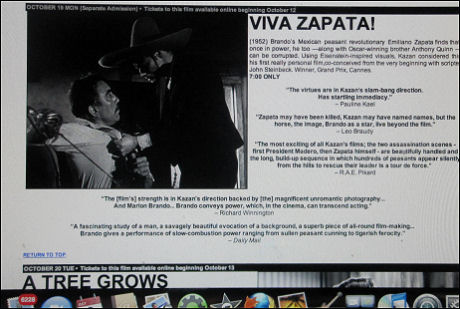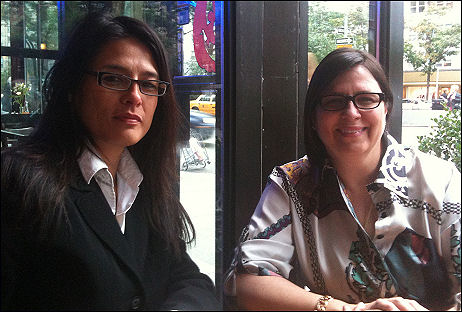I have to catch a 6 pm Newark plane so I have to start the run-around now or I’ll wind up missing it. So that’s it until I hit the airport around 4:30 or so. I’ll see how it goes.
Zapata For A Day
Since Elia Kazan‘s Viva Zapata still isn’t out on DVD (and apparently won’t be any time soon, according to a guy I recently spoke to who seemed to know a few things), it’s a priority for me to see it at the Film Forum on Monday, 10.19, as part of a three-week Kazan series.

The effete snooties have been putting this film down for years, calling it a sentimentalized, white-liberal view of the Mexican revolution. And the fact that John McCain has called it his favorite film can’t be interpreted as a good thing. But the craft, heart and political conviction in Viva Zapata still feel genuine to me. Kazan was coming to terms with ratting (i.e., confirming names) when he made it, but he was still an old leftie from the ’30s and knew about the emotion behind a rebellion.
Zapata is one of Brando’s three golden-era Kazan collaborations, two years before Waterfront and a year after Streetcar. And he’s truly great in the lead role. Ditto Anthony Quinn and Joseph Wiseman in theirs. (I’ve always loved how Wiseman, playing a manic political agitator type, shouts in a crazy manic stream, “Zapata, in thenameofeverythingwefoughtfor don’t go!”) And Brando’s death scene near the finale (i.e., getting shot 112 times) is a classic of its kind.
Werc Werk Works
I had a brief but pleasant chat yesterday afternoon with Elizabeth Redleaf and Christine Kunewa Walker, the co-founders of the Minneapolis-based production company Werc Werk Works. They’re basically into using private-equity funding (drawn from the coffers of their rich pallies in Minneapolis) and financing arthouse movies at a price. I didn’t ask them what that price is exactly, but figure something low. (Or…you know, kinda lowish.)

Werc Werk Works’ Christine Kunewa Walker and Elizabeth Redleaf — Thursday, 10.8, 6:35 pm.
At one point I mentioned the financing philosophy of producer Robert Evans , which is basically that talent needs to take a little upfront but primarily be ready to gamble. If the film works out, we’ll all make out and if it doesn’t…well, there’s always the next one. Or words to that effect. One of the partners (I forget if it was Redleaf or Walker) said they’re more or less operating according to the Evans plan.
They’ve made (i.e., largely financed and produced) three films so far — Todd Solondz‘s Life During Wartime, Rob Epstein and Jeffrey Friedman‘s Howl and Bela Tarr‘s The Turin Horse. And they recently announced a fourth — Jill and Karen Sprecher‘s The Convincer, about “a salesman who seeks to acquire a rare musical instrument,” according to a trade announcement.
These are basically upscale wine-and-cheese movies, which Redleaf and Walker are obviously into. Minneapolis is a very hip and liberal town and these two are very much woven into that fabric, and they’ve figured out a way to finance films of this stripe in a way that makes financial sense, and…hey, that’s cool. And “wine and cheese” is not a perjorative term. It simply means movies attuned to educated people with seasoned taste buds. (The three-toed sloth who lives above my place wouldn’t touch any of their films with a ten-foot pole, and good for that.)
I can’t honestly say I’m a huge cartwheeling fan of Life During Wartime, but I know what Howl is (i.e., about Allen Ginsberg‘s famous ’50s poem and the obscenity charges he faced because of it) and I’m a big fan of James Franco (who plays Ginsberg) and I know about the aesthetic tendencies of Bela Tarr so I think I get it. Refined serious-edgy stuff and no popcorn pablum…right?
It’s a very tough world out there now and a lot of producer-financiers are on shaky ground or have been knocked out of the game altogether, but Werc Werk Works is well-planted and viable and committed and all that other good jazz.
They first met through the Walker Arts Center Film Society in Minneapolis, which Redleaf founded a few years ago and which functions as a kind of Lincoln Center-esque institution. Redleaf is also a member of the Telluride Film Festival board and serves on the IFP Minnesota board. Walker wrote and produced Older Than America, produced Factotum and line-produced American Splendor, which won the Grand Jury Prize at the 2003 Sundance Film Festival and the International Critics Award at the Cannes Film Festival.
Yesterday I was having trouble remembering their production company’s name, to be honest. I was trying to think of it as I rode uptown on the IRT to meet them at a place on Broadway and 69th. I knew it was three variations of the word “work” but I just couldn’t remember which one has a “c” and which has a “k” or whatever, but it’s starting to stick to the grooves in my brain. I get the game. I’m down with the program.
He Lives
I was reminded this morning by DVD Beaver’s Gary Tooze about the 10.27 arrival of Z, the landmark 1969 political thriller from director Costa-Gavras, on a Criterion Collection DVD. A restored high-def digital transfer. Audio commentary featuring film historian Peter Cowie. New interviews with Costa-Gavras and dp Raoul Coutard. And a booklet essay by Armond White, among other extras.
It’s one of the best political pulse-pounders ever made, and one of the few to make my eyes water over. It’s deeply engrossing for the taut writing and crackerjack performances, the urgent docu-style realism throughout, and especially the emotional inspiration it delivers at the finale. I’m figuring there must be at least a couple of generations of serious filmgoers who’ve never caught it, or perhaps have never heard of it. Whichever way (and even for those who saw it in theatres 40 years ago), this is really and truly a disc to settle into.
Based on a 1966 novel of the same name by Vassilis Vassilikos, Z is a slightly fictionalized, largely truthful account of events surrounding the assassination of democratic Greek politician Gregoris Lambrakis in 1963.
An ensemble piece with a central through-line, Z is mainly about the political awakening of an investigating magistrate (Jean-Louis Trintignant) who gradually comes to realize that Lambrakis (Yves Montand) wasn’t accidentally killed by a hit-and-run driver but clubbed to death by a right-wing thug on behalf of the Greek military, who eventually took over and ran Greece junta-style from ‘1969 to ’74.
But of course it’s also a metaphor for all struggles — now, then, forever — between rightist strong-man governments and thoughtful, truth-seeking, power-to-the-liberal-wing types.
Irene Pappas costars as Zambrakis’s wife, but the lifeblood of Z is in the vigorous performances by numerous secondary performers.
Trintignant’s investigator is based on Christos Sartzetakis, who years later was appointed President of Greece by democratically-elected parliamentarians.
“Everybody said there is no love story, there is no central character, the story of a Greek senator who is killed….who really cares about it?,” Costa-Gavras said in a recent interview. And so forth. There was nothing looking like a usual movie: there are so many people in the movie, there is no one character from the beginning to the end.”
Shot in 1968 and ’69, Z “was made as a kind of protest against the colonists in Greece,” he explained. “All Greeks out of Greece at that time, they tried to do something about it – riots and whatever, and signed petitions, and the only thing I could do is to make a movie. When I did the script, all the actors you saw accepted to play in it, but no producer or distributor would give a penny to make the movie.
“I had a grant from the French government…and with that I was going around, and everybody refused except for the Algerians, who said, ‘Okay, you can do it here, but we don’t have any money to give to you. We give you all the facilities to shoot in the street, and some technicians.’ Almost all of the major actors [and] myself [made the film] without being paid.
“And we did the movie for $400,000, and it was amazing, because during the shooting, we asked two journalists to come and see us and to write some articles. Nobody came. And when the movie came out, the first week it did very poorly, because a lot of people wrote about the political content of the movie, and people were a little scared about the political movies, you know. But little by little, the movie was playing for something like 45 weeks in Paris. It was a huge success in Paris and around the world, which was a big surprise also, because nobody was believing or accepting [at first]. So that was the story of Z.”
Z won the 1969 Cannes Film Festival Jury Prize, and Trintignant was named Best Actor. It also won New York Film Critics Circle award for Best Film and Best Director, and the 1970 Best Foreign Language Film Oscar along with an Oscar for Best Editing (i.e., Françoise Bonnot). Z was the first film to be nominated for Academy Awards both for Best Foreign Language Film and for Best Picture.
The film ends ironically with a French TV reporter explaining that despite Trintignant’s character having indicted the Zambrakis killers, all the good guys were subsequently dismissed, busted or disappeared, and the assassins, though convicted of murder, had their sentences reduced, and the military officers involved received only administrative reprimands.
As the end-credits section begins (but before listing the cast and crew), Costa-Gavras listed things banned by the Greek junta. They included peace movements, strikes, labor unions, long hair on men, the Beatles, other modern and popular music (“la musique populaire”), Sophocles, Leo Tolstoy, Aeschylus, writing that Socrates was homosexual, Eugene Ionesco, Jean-Paul Sartre, Anton Chekhov, Harold Pinter, Edward Albee, Mark Twain, Samuel Beckett, the bar association, sociology, international encyclopedias, free press, and new math.
Also banned was the letter Z, which was used as a symbolic reminder that Lambrakis (and by extension the spirit of resistance) lives.
Yeti
I was awoken at 4:30 am by the sound of that snoring ape upstairs. Yes, the Hispanic Party Elephant of legend. Who sleeps in a bedroom directly above mine. His snoring is so guttural and persistent that once you’ve awakened there’s no going back to sleep. And the sound of the thonging mattress springs and the bed frame creaking and groaning for dear life when he rolls over is appalling. It’s sublime knowing I won’t have to deal with this guy (who fancies himself to be a crooner, by the way — he sings Spanish love ballads as he clomps down the stairs on his way to work) any more after 10.30.09.
Another Anvil! Surge
The Envelope‘s Pete Hammond reported last night that Sacha Gervasi‘s Anvil!: The Story of Anvil has become the first 2009 film to be mass-mailed to the nearly 6000-person Academy membership. The Anvil! team has been hustling hard since last spring, and this shows they haven’t relented. It also seems that a belief in Anvil! being one of the best docs of the year has gradually sunk in…even if Hammond himself is still skeptical.

Anvil’s Rob Reiner, “Lips” Kudlow.
“This little, virtually self-distributed underdog documentary, about a couple of underdog fiftysomething heavy-metal rockers forced to work at menial day jobs while never giving up on their longshot musical dreams, is now a (way) underdog contender for Oscars,” he says.
I was met with some skepticism last April when I asked how can Anvil! “not wind up being nominated for Best Feature Documentary Oscar? It’s got heart. It’s about over-the-hill, down-on-their-luck artists getting their groove back. It’s well made, it’s connecting with audiences, it’s funny, it’s lowbrow-highbrow. How can Academy’s doc committee ignore it?”
Being the first screener sent out “is a nice distinction,” Hammond allows, “and giving voters plenty of time to see it has resulted in good nomination luck for the likes of Little Miss Sunshine, Junebug and last year’s Frozen River, among others.
“But Anvil? When the film debuted at the 2008 Sundance Film Festival, they couldn’t get arrested, so the filmmakers and the band initially released it themselves (with the key help of Richard Abramowitz’s distribution company, Abramorama). Now look at them.”
I kind of thought that The Hurt Locker might be the first screener out of the gate. But you know Summit.
Last Wednesday the heavy-metal group “made their movie debut on the set of fan and director Michel Gondry’s big-budget flick The Green Hornet, filming a cameo where they (literally) explode playing in a rock club,” Hammond reports. “Thursday night they appeared at a screening/q & a at the WGA Theatre in Beverly Hills moderated by Oscar-winning screenwriter Steven Zaillian and ‘hosted’ by such academy members as Gondry, Tilda Swinton and Catherine Keener (who hosted a party for them as well earlier in the week). Now on Friday, their little-movie-that-could should be in most Academy voters’ mailboxes.
“Perhaps the drive to get the film out now to every Oscar voter is partially due to the film’s overwhelming critical support. It currently stands at 98% fresh on Rotten Tomatoes, easily of the highest ratings of the year.”
But the main reason people like the film so much, as I put it last April, is that “everything about Anvil! says that life can be fair, second chances are possible, and while not every loser or also-ranner bounces back, these guys sure did.”
Is It Deserved?
The Nobel Committee stunned a lot of people earlier today by giving its annual peace prize to Barack Obama “‘for his extraordinary efforts to strengthen international diplomacy and cooperation between peoples’ less than nine months after he took office.” In short, for being a symbol of profound change, for giving people a generalized sense of hope and for reaching out to Muslims with his Cairo speech. But what is so peaceful and noble about digging America into the swamp of Afghanistan just as surely as Lyndon Johnson goaded this country into Vietnam in the mid ’60s?
Walter Gibbs and Alan Cowell‘s 10.9 N.Y. Times story says that “with American forces deployed in Iraq and Afghanistan, President Obama’s name had not figured in speculation about the winner until minutes before the prize was announced here.
“Reporters at a news conference to announce the prize pressed the committee’s chairman, Thorbjorn Jagland, to explain the reasons Mr. Obama had prevailed over other candidates who included human rights activists in China and Afghanistan and political figures in Africa.
“Specifically, reporters asked whether Mr. Obama might not become mired in a war in Afghanistan as Lyndon B. Johnson was in Vietnam.
“But the committee said it wanted to enhance Mr. Obama’s diplomatic efforts so far rather than anticipate events in the future. Mr. Jagland, a former prime minister of Norway, said that Mr. Obama had already contributed enough to world diplomacy and understanding to deserve the prize.
“As to whether the prize was given too early in Mr. Obama’s presidency, he said: ‘We are not awarding the prize for what may happen in the future but for what he has done in the previous year. We would hope this will enhance what he is trying to do.'”
Bring It On, Clint
Jason Reitman‘s Up In The Air “certainly deserves a best-picture nomination, and Oscar voters will know it,” says The Wrap‘s Steve Pond in a 10.8 posting. “At the moment I’d say it’s the closest thing we’ve got to The One to Beat.”
“When Juno was up for the top prize, Reitman also got a nod for best director; this time around, he should easily do the same. (It won’t hurt that he may be the nicest guy on the awards circuit these days.) George Clooney‘s an obvious best-actor contender, and on the supporting-actress front the only real question is whether the nominations will go to Vera Farmiga, Anna Kendrick, or both of them. (I’d opt for the pitch-perfect Farmiga, though Kendrick has the flashier role.) And you might as well throw in music and a few other categories.”
Five Animated Contenders?
Yesterday The Envelope‘s Pete Hammond wrote “there’s a good chance the best animated feature category could jump from three to five nominees for the first time since 2002, the only year to feature more than three contenders since [the category] was created in 2001.” The top three, he says, are Coraline, Ponyo and Up, but you could expand it to five by only selecting two from the following: Mary and Max, Ice Age: Dawn of the Dinosaurs, Monsters Vs. Aliens, Planet 51, A Christmas Carol, Cloudy With a Chance of Meatballs or Wes Anderson‘s The Fantastic Mr. Fox.
Nine Bumped to late December?
Three hours ago Rope of Silicon‘s Brad Brevet reported that Rob Marshall‘s Nine has been officially bumped from the currently slated release date of 11.29 to a limited 12.18 release in New York and Los Angeles and will then wide on 12.25. I wrote Weinstein Co. reps about this and haven’t heard back. I just checked the trades and the key sites (MCN, Nikki Finke, The Wrap, In Contention, Movieline, Awards Daily, Indiewire, New York Vulture, The Playlist) and no one’s running with it.
Parnassus Burger
We all know how trailers can flim-flam, but you have to admit that this one for Terry Gilliam‘s The Imaginarium of Dr. Parnassus (Sony Classics, 12.25) makes it look fairly rich and mad (i.e., the work of a gifted madman) and shimmering and splendorific. It even makes Johnny Depp and Colin Farrell‘s substituting-for-Heath thing seem to more or less merge with the whole.

